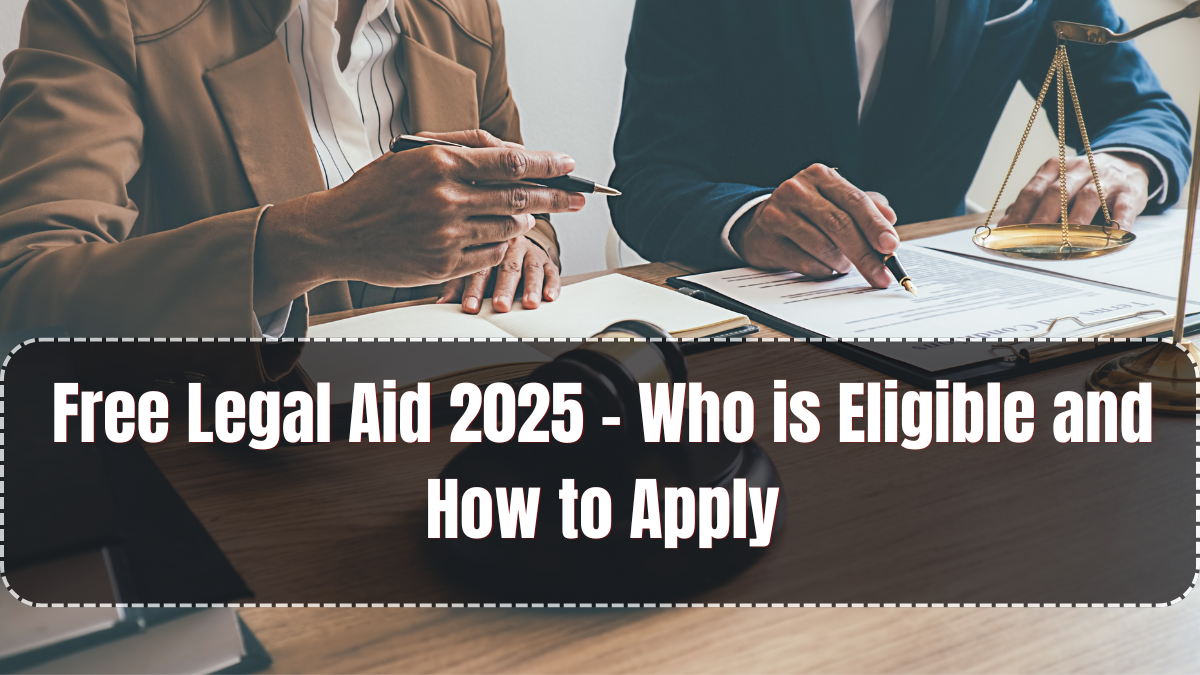Legal services in India have always been seen as expensive and time-consuming. But to ensure justice for all, the Indian government offers free legal aid to eligible citizens who cannot afford to hire a lawyer. In 2025, the Legal Services Authorities (LSA) Act continues to be the backbone of this initiative, offering legal help through District Legal Services Authorities (DLSA), Legal Aid Clinics, and Lok Adalats across India.
This guide explains everything you need to know about free legal help in 2025 — from who qualifies, how to apply, where to go, and what types of cases are covered.

What Is Free Legal Aid?
Free legal aid is a constitutional right guaranteed under Article 39A of the Indian Constitution, ensuring equal access to justice regardless of income or background. Under this scheme, the government appoints a competent lawyer to represent you at no cost in civil, criminal, or family-related cases.
The service is provided by:
-
National Legal Services Authority (NALSA)
-
State Legal Services Authorities (SLSAs)
-
District Legal Services Authorities (DLSAs)
Whether you’re fighting a land dispute, domestic violence case, or need help writing a legal notice, these services are free for those who meet the criteria.
Who Is Eligible for Free Legal Aid in 2025?
As per the updated 2025 guidelines, the following individuals are automatically eligible:
-
Women and children (no income limit)
-
Scheduled Castes (SC) and Scheduled Tribes (ST)
-
Senior citizens (60+ years)
-
Persons with disabilities
-
Victims of human trafficking
-
Victims of mass disasters/natural calamities
-
People in custody, jail, or protective homes
-
People with annual income less than ₹3 lakh (varies by state)
Note: Some states have increased the income cap to ₹4 lakh due to inflation in 2025. Check with your local DLSA for confirmation.
Where Can You Get Free Legal Help?
You can reach out to:
-
DLSA Office at your district court
-
Legal Aid Clinics set up in law colleges or remote areas
-
Mobile Legal Aid Vans in villages
-
Lok Adalat (for fast-track out-of-court settlements)
Each DLSA has a panel of government-approved lawyers ready to take up your case. Many courts also have help desks that guide you to the correct authority.
What Legal Matters Are Covered?
Free legal aid can be availed for both civil and criminal cases, including:
-
Family disputes (divorce, maintenance, custody)
-
Domestic violence and dowry cases
-
Labour or employment issues
-
Land or property disputes
-
Tenancy issues and eviction
-
Criminal cases involving undertrials or petty offences
-
Consumer complaints
-
PILs (Public Interest Litigations)
Some high-value property or commercial disputes may not be covered if they fall outside the jurisdiction of legal aid authorities.
How to Apply for Free Legal Aid in 2025
1. Visit Your Nearest DLSA Office
Go to the district court complex and locate the Legal Services Authority room or desk.
2. Submit Application
You’ll need to fill out a standard application form that includes your personal details, income certificate, case details, and supporting documents like Aadhaar card, caste certificate, etc.
3. Verification
The DLSA staff will verify your income and case background. In urgent matters, legal aid may be provided on the same day.
4. Lawyer Appointment
A panel advocate will be assigned, and a notice will be sent to the court. You can meet the lawyer regularly and stay updated on your case progress.
New Features in 2025 Legal Aid Process
-
Online Legal Aid Application Portals now available in most states
-
Free legal consultation via WhatsApp introduced in select urban DLSAs
-
Mobile App Support from NALSA for live case updates and virtual legal aid
-
Helplines active 24×7 in several high-load districts
These tech-driven reforms are aimed at making legal services more accessible, especially in rural and tier-2 cities.
Why Legal Aid Matters
In a country where millions cannot afford legal representation, the free legal help program helps:
-
Prevent exploitation
-
Support vulnerable communities
-
Reduce legal backlogs via out-of-court solutions
-
Ensure equality before law
Legal awareness campaigns and Legal Literacy Clubs are also being promoted in schools and colleges under NALSA’s 2025 strategy.
FAQs
Is free legal aid available for divorce or domestic violence cases?
Yes, women are automatically eligible, and free legal aid covers all family matters including divorce, custody, maintenance, and domestic violence.
Can I choose my own lawyer under free legal aid?
You can request a change of lawyer if you are not satisfied with the assigned panel advocate, but you cannot appoint a private lawyer under this scheme.
Do I have to pay anything later if I win the case?
No. Free legal aid is a welfare scheme and does not require you to pay any fee, even if you win compensation or property in the case.
What if my application is rejected?
You can appeal to the State Legal Services Authority (SLSA) or even write to NALSA with your grievance. They may reconsider your eligibility.
Is there any age limit for legal aid?
Senior citizens (60+) are automatically eligible, and there is no age restriction for others if income or background criteria are met.
Click here to know more.
